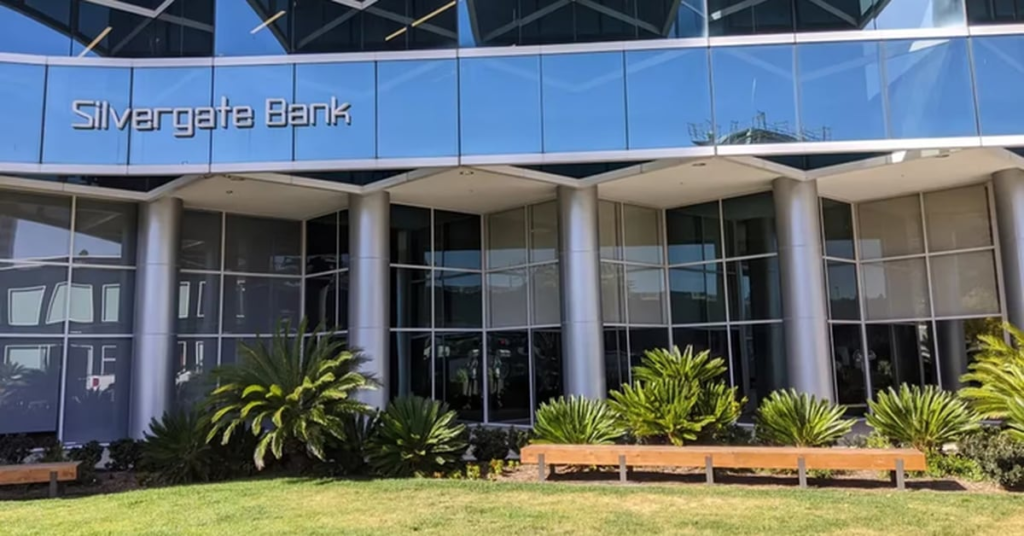
-
Silvergate
Bank’s
parent
company
settled
charges
with
the
Securities
and
Exchange
Commission,
Federal
Reserve
and
California
Department
of
Financial
Protection
and
Innovation
alleging
it
failed
to
maintain
a
proper
anti-money
laundering
program
and
made
misleading
disclosures
about
the
program’s
effectiveness. -
The
SEC
also
charged
Silvergate’s
former
executives.
Former
CEO
Alan
Lane
and
former
COO
Kathleen
Fraher
agreed
to
settlements,
while
former
CFO
Antonio
Martino
denied
the
charges.
Silvergate
Capital
Corp.,
parent
of
the
crypto-friendly
bank
whose
2023
collapse
amplified
the
industry’s
banking
crisis,
has
agreed
to
pay
$63
million
to
settle
U.S.
and
California
regulators‘
accusations
of
internal
management
failings
and
the
disclosure
of
bad
information
to
investors.
The
U.S.
Securities
and
Exchange
Commission
(SEC)
sued
Silvergate
Capital
Corporation,
the
parent
company
to
crypto-friendly
Silvergate
Bank,
former
CEO
Alan
Lane,
former
COO
Kathleen
Fraher
and
former
CFO
Antonio
Martino
on
Monday,
alleging
the
bank
misled
the
public
and
shareholders
about
having
an
effective
Bank
Secrecy
Act/anti-money
laundering
program
when
it
didn’t.
The
Federal
Reserve
and
California’s
Department
of
Financial
Protection
and
Innovation
(DFPI)
similarly
brought
charges
against
the
La
Jolla,
California-based
lender.
Silvergate,
Lane
and
Fraher
agreed
to
settlements
where
they
neither
admit
to
nor
deny
the
SEC’s
allegations,
but
will
pay
penalties,
and
the
two
individuals
agreed
to
a
five-year
ban
on
being
officers
or
directors
of
another
public
company.
Silvergate
also
settled
with
both
the
Fed
and
DFPI.
Silvergate’s
penalties
included
$43
million
from
the
Fed
and
$20
million
from
the
California
regulator,
which
had
also
cited
deficiencies
in
how
the
bank
kept
track
of
internal
transactions.
The
SEC
imposed
its
own
$50
million
fine,
too,
but
it
wasn’t
expected
to
add
to
the
total.
The
settlements
are
subject
to
court
approval,
and
the
SEC
said
in
its
press
release
that
any
monetary
penalty
owed
it
might
be
offset
by
whatever
Silvergate
pays
to
the
banking
regulators.
Martino,
the
former
chief
financial
officer,
denied
the
allegations
through
a
statement
from
his
attorneys,
saying
those
accusations
are
tied
to
a
single
quarter
in
2022,
and
pertain
to
“judgement-driven”
decisions.
“On
several
occasions
prior
to
November
2022,
Lane
and
Fraher
–
and
through
them
SCC
–
became
aware
that
the
Bank
had
serious
deficiencies
in
its
BSA/AML
compliance
program,”
the
complaint
said.
“In
addition,
through
the
results
of
multiple
examinations
of
Silvergate
by
the
Federal
Reserve,
through
the
Federal
Reserve
Bank
of
San
Francisco
(the
‘FRBSF’),
Lane
and
Fraher
should
have
known
that
there
existed
critical
deficiencies
in
the
Bank’s
BSA/AML
compliance
program.”
As
part
of
its
complaint,
the
SEC
alleged
that
Silvergate
failed
to
detect
nearly
$9
billion
worth
of
suspicious
transfers
by
major
customer
FTX,
which
filed
for
bankruptcy
in
November
2022.
“For
most
of
2021
and
2022,
the
Bank
had
not
conducted
appropriate
automated
monitoring
of
its
preeminent
product,
the
‘Silvergate
Exchange
Network’
(the
‘SEN’),”
the
complaint
said.
“The
SEN
was
a
key
mechanism
for
the
Bank’s
crypto
asset
customers
to
transfer
funds
amongst
themselves
and
was
tailormade
to
attract
crypto
asset
customers.
But
the
Bank
failed
to
adequately
or
automatically
monitor
for
suspicious
activity
approximately
$1
trillion
in
banking
transactions
that
occurred
on
the
SEN.”
Silvergate’s
team
received
word
from
its
government
examiners
that
its
efforts
were
inadequate,
the
suit
alleged,
but
it
still
claimed
that
there
were
no
risk
factors
in
its
quarterly
or
annual
reporting
(10-Q
and
10-K
forms).
A
2021
quarterly
filing
did
“acknowledge”
that
the
bank
faced
a
“heightened
risk”
due
to
some
of
its
crypto
customers,
but
the
bank
did
not
disclose
that
its
executives
had
been
made
aware
of
specific
deficiencies
tied
to
its
Bank
Secrecy
Act
compliance.
A
Silvergate
spokesperson
told
CoinDesk
the
settlements
are
part
of
the
bank’s
ongoing
efforts
to
wind
down.
“In
early
March
2023,
Silvergate
made
a
responsible
decision
to
liquidate
voluntarily
and
without
government
assistance.
As
of
November
2023,
all
deposits
had
been
repaid
to
banking
customers
and
Silvergate
ceased
banking
operations
soon
after.
The
settlements
announced
today,
which
will
facilitate
the
surrender
of
Silvergate’s
bank
charter,
are
part
of
the
Bank’s
continued
orderly
wind
down
and
successfully
conclude
investigations
by
the
Federal
Reserve,
DFPI
and
SEC,”
the
spokesperson
said
in
an
emailed
statement.
Voluntary
liquidation
Silvergate,
which
had
been
the
go-to
bank
for
major
crypto
businesses,
voluntarily
folded
under
the
pressure
of
the
sector’s
epic
headwinds
and
was
the
first
of
three
technology-tied
lenders
to
be
shuttered
during
that
period’s
so-called
crypto
winter.
The
other
two
—
Silicon
Valley
Bank
and
Signature
Bank
—
were
seized
and
liquidated
by
U.S.
authorities,
while
Silvergate
had
moved
to
wind
itself
down
without
government
intervention
or
a
need
for
federal
help
to
pay
back
depositors.
The
loss
of
Silvergate
and
the
other
two
institutions
touched
off
months
of
U.S.
banking
mayhem
that
also
left
digital
assets
companies
scrambling
for
hard-to-find
financial
relationships
as
crypto
fell
further
out
of
favor.
Silvergate
had
experienced
a
rapid
rise
from
being
a
tiny
community
bank
to
becoming
the
digital
assets
sector’s
leading
financial
partner,
but
its
descent
was
even
faster.
The
end
was
tied
to
a
March
2023
securities
filing
disclosing
that
the
firm,
which
had
bet
its
future
on
the
crypto
industry,
accelerated
sales
of
securities
to
raise
cash
to
repay
advances
from
the
Federal
Home
Loan
Bank
of
San
Francisco.
But
the
warning
signs
had
been
there
previous
to
that
as
the
institution
lost
more
than
$8
billion
in
deposits
from
its
crypto
customers
in
the
final
months
of
2022.
The
Federal
Reserve’s
inspector
general
concluded
in
an
October
2023
report
that
Silvergate’s
management
had
been
“ineffective,”
and
its
minders
from
the
federal
regulator
failed
to
adjust
to
what
was
going
on
with
the
business.
UPDATE
(July
1,
2024,
20:05
UTC):
Adds
additional
detail.
UPDATE
(July
1,
20:45
UTC):
Adds
SEC
statement
and
settlement
detail.